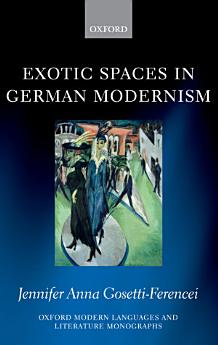Exotic Spaces in German Modernism
okt. 2011 · OUP Oxford
Rafbók
288
Síður
family_home
Gjaldgeng
info
reportEinkunnir og umsagnir eru ekki staðfestar Nánar
Um þessa rafbók
Jennifer Anna Gosetti-Ferencei demonstrates that the exotic, as reflected in major works of German literature and in the philosophy and art that inspires it, provokes central questions about the modern self and the spaces it inhabits. Exotic spaces in the writings of such authors as Thomas Mann, Franz Kafka, Stefan Zweig, Robert Musil, Hugo von Hofmannsthal, Gottfried Benn, and Bertold Brecht, along with the thought of Nietzsche, Freud, Levi-Strauss, and Simmel and the art of German Expressionism, are shown to present alternatives to the landscape and experience of modernity. In an examination of the concept of the exotic and of spatial experience in their cultural, subjective, and philosophical contingencies, Gosetti-Ferencei shows that exotic spaces may contest and reconfigure the relationship between the familiar and the foreign, the self and the other. Exotic spaces may serve not only to affirm the subject in a symbolic conquering of territory, as emphasized in post-colonial interpretations, or project the fantasy of escapism to a lost paradise, as utopian readings suggest, but condition moral, aesthetic, or imaginative transformation. Such transformation, while risking disaster or dissolution of the self as well as endangerment of the other, may promote new possibilities of perceiving or being, and reconfigure the boundaries of a familiar world. As exotic spaces are conceived as mystical, liberating, erotic, infectious, frightening or mysterious, several possibilities for transformation emerge in their exposure: re-enchantment through epiphany; the collapse of the rational self; liberation of the imagination from the confines of the familiar world; and aesthetic transformation, revealing the paradoxically 'primitive' nature of modern experience. In strikingly original readings of canonical authors and compelling rediscoveries of forgotten ones, this study establishes that exotic experience can evidence the fragility of the European or Germanic self as depicted in modernist literature, revealing the usually unconsidered boundaries of the subject's own familiar world.
Um höfundinn
Jennifer Anna Gosetti-Ferencei is Professor of Philosophy, Director of Graduate Studies in Philosophy, and a member of the Literary Studies Faculty at Fordham University in New York City, where she teaches Continental Philosophy, Aesthetics, and the Philosophy of Literature. She completed graduate studies at Oxford University (DPhil, German Literature; MSt, European Literature); Columbia University (MFA, poetry); and Villanova University (PhD, MA, philosophy). Her previous books include Heidegger, Hölderlin, and the Subject of Poetic Language; The Ecstatic Quotidian: Phenomenological Sightings in Modern Art and Literature; and After the Palace Burns, which won The Paris Review Prize in poetry. She is also co-translator of Heidegger's Phenomenology of Religious Life.
Gefa þessari rafbók einkunn.
Segðu okkur hvað þér finnst.
Upplýsingar um lestur
Snjallsímar og spjaldtölvur
Settu upp forritið Google Play Books fyrir Android og iPad/iPhone. Það samstillist sjálfkrafa við reikninginn þinn og gerir þér kleift að lesa með eða án nettengingar hvar sem þú ert.
Fartölvur og tölvur
Hægt er að hlusta á hljóðbækur sem keyptar eru í Google Play í vafranum í tölvunni.
Lesbretti og önnur tæki
Til að lesa af lesbrettum eins og Kobo-lesbrettum þarftu að hlaða niður skrá og flytja hana yfir í tækið þitt. Fylgdu nákvæmum leiðbeiningum hjálparmiðstöðvar til að flytja skrár yfir í studd lesbretti.





